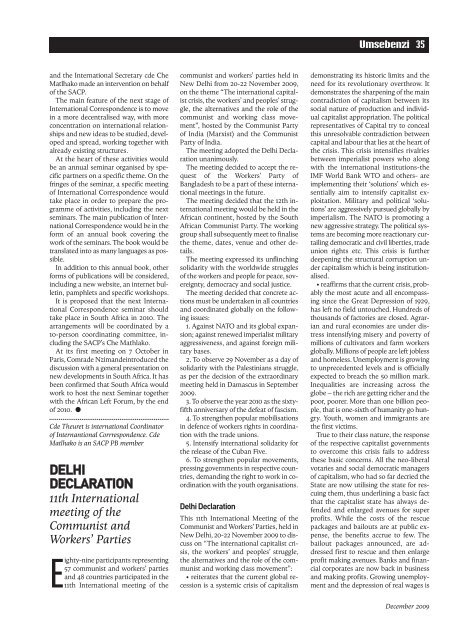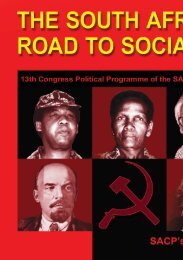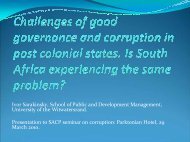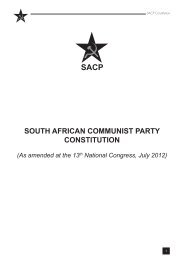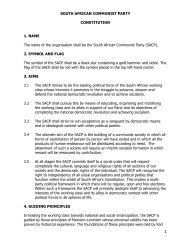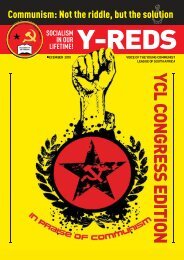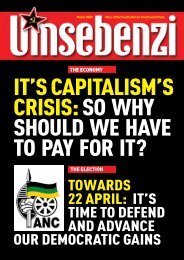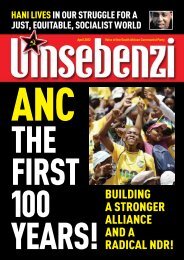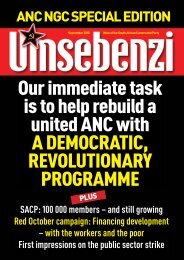Forward to Socialism!! - South African Communist Party
Forward to Socialism!! - South African Communist Party
Forward to Socialism!! - South African Communist Party
You also want an ePaper? Increase the reach of your titles
YUMPU automatically turns print PDFs into web optimized ePapers that Google loves.
Umsebenzi 35<br />
and the International Secretary cde Che<br />
Matlhako made an intervention on behalf<br />
of the SACP.<br />
The main feature of the next stage of<br />
International Correspondence is <strong>to</strong> move<br />
in a more decentralised way, with more<br />
concentration on international relationships<br />
and new ideas <strong>to</strong> be studied, developed<br />
and spread, working <strong>to</strong>gether with<br />
already existing structures.<br />
At the heart of these activities would<br />
be an annual seminar organised by specific<br />
partners on a specific theme. On the<br />
fringes of the seminar, a specific meeting<br />
of International Correspondence would<br />
take place in order <strong>to</strong> prepare the programme<br />
of activities, including the next<br />
seminars. The main publication of International<br />
Correspondence would be in the<br />
form of an annual book covering the<br />
work of the seminars. The book would be<br />
translated in<strong>to</strong> as many languages as possible.<br />
In addition <strong>to</strong> this annual book, other<br />
forms of publications will be considered,<br />
including a new website, an internet bulletin,<br />
pamphlets and specific workshops.<br />
It is proposed that the next International<br />
Correspondence seminar should<br />
take place in <strong>South</strong> Africa in 2010. The<br />
arrangements will be coordinated by a<br />
10-person coordinating committee, including<br />
the SACP’s Che Mathlako.<br />
At its first meeting on 7 Oc<strong>to</strong>ber in<br />
Paris, Comrade Nzimandeintroduced the<br />
discussion with a general presentation on<br />
new developments in <strong>South</strong> Africa. It has<br />
been confirmed that <strong>South</strong> Africa would<br />
work <strong>to</strong> host the next Seminar <strong>to</strong>gether<br />
with the <strong>African</strong> Left Forum, by the end<br />
of 2010.<br />
Cde Theuret is international Coordina<strong>to</strong>r<br />
of Internantional Corrrespondence. Cde<br />
Matlhako is an SACP PB member<br />
DELHI<br />
DECLARATION<br />
11th International<br />
meeting of the<br />
<strong>Communist</strong> and<br />
Workers’ Parties<br />
Eighty-nine participants representing<br />
57 communist and workers’ parties<br />
and 48 countries participated in the<br />
11th International meeting of the<br />
communist and workers’ parties held in<br />
New Delhi from 20-22 November 2009,<br />
on the theme “The international capitalist<br />
crisis, the workers’ and peoples’ struggle,<br />
the alternatives and the role of the<br />
communist and working class movement”,<br />
hosted by the <strong>Communist</strong> <strong>Party</strong><br />
of India (Marxist) and the <strong>Communist</strong><br />
<strong>Party</strong> of India.<br />
The meeting adopted the Delhi Declaration<br />
unanimously.<br />
The meeting decided <strong>to</strong> accept the request<br />
of the Workers’ <strong>Party</strong> of<br />
Bangladesh <strong>to</strong> be a part of these international<br />
meetings in the future.<br />
The meeting decided that the 12th international<br />
meeting would be held in the<br />
<strong>African</strong> continent, hosted by the <strong>South</strong><br />
<strong>African</strong> <strong>Communist</strong> <strong>Party</strong>. The working<br />
group shall subsequently meet <strong>to</strong> finalise<br />
the theme, dates, venue and other details.<br />
The meeting expressed its unflinching<br />
solidarity with the worldwide struggles<br />
of the workers and people for peace, sovereignty,<br />
democracy and social justice.<br />
The meeting decided that concrete actions<br />
must be undertaken in all countries<br />
and coordinated globally on the following<br />
issues:<br />
1. Against NATO and its global expansion;<br />
against renewed imperialist military<br />
aggressiveness, and against foreign military<br />
bases.<br />
2. To observe 29 November as a day of<br />
solidarity with the Palestinians struggle,<br />
as per the decision of the extraordinary<br />
meeting held in Damascus in September<br />
2009.<br />
3. To observe the year 2010 as the sixtyfifth<br />
anniversary of the defeat of fascism.<br />
4. To strengthen popular mobilisations<br />
in defence of workers rights in coordination<br />
with the trade unions.<br />
5. Intensify international solidarity for<br />
the release of the Cuban Five.<br />
6. To strengthen popular movements,<br />
pressing governments in respective countries,<br />
demanding the right <strong>to</strong> work in coordination<br />
with the youth organisations.<br />
Delhi Declaration<br />
This 11th International Meeting of the<br />
<strong>Communist</strong> and Workers’ Parties, held in<br />
New Delhi, 20-22 November 2009 <strong>to</strong> discuss<br />
on “The international capitalist crisis,<br />
the workers’ and peoples’ struggle,<br />
the alternatives and the role of the communist<br />
and working class movement”:<br />
• reiterates that the current global recession<br />
is a systemic crisis of capitalism<br />
demonstrating its his<strong>to</strong>ric limits and the<br />
need for its revolutionary overthrow. It<br />
demonstrates the sharpening of the main<br />
contradiction of capitalism between its<br />
social nature of production and individual<br />
capitalist appropriation. The political<br />
representatives of Capital try <strong>to</strong> conceal<br />
this unresolvable contradiction between<br />
capital and labour that lies at the heart of<br />
the crisis. This crisis intensifies rivalries<br />
between imperialist powers who along<br />
with the international institutions-the<br />
IMF World Bank WTO and others- are<br />
implementing their ‘solutions’ which essentially<br />
aim <strong>to</strong> intensify capitalist exploitation.<br />
Military and political ‘solutions’<br />
are aggressively pursued globally by<br />
imperialism. The NATO is promoting a<br />
new aggressive strategy. The political systems<br />
are becoming more reactionary curtailing<br />
democratic and civil liberties, trade<br />
union rights etc. This crisis is further<br />
deepening the structural corruption under<br />
capitalism which is being institutionalised.<br />
• reaffirms that the current crisis, probably<br />
the most acute and all encompassing<br />
since the Great Depression of 1929,<br />
has left no field un<strong>to</strong>uched. Hundreds of<br />
thousands of fac<strong>to</strong>ries are closed. Agrarian<br />
and rural economies are under distress<br />
intensifying misery and poverty of<br />
millions of cultiva<strong>to</strong>rs and farm workers<br />
globally. Millions of people are left jobless<br />
and homeless. Unemployment is growing<br />
<strong>to</strong> unprecedented levels and is officially<br />
expected <strong>to</strong> breach the 50 million mark.<br />
Inequalities are increasing across the<br />
globe – the rich are getting richer and the<br />
poor, poorer. More than one billion people,<br />
that is one-sixth of humanity go hungry.<br />
Youth, women and immigrants are<br />
the first victims.<br />
True <strong>to</strong> their class nature, the response<br />
of the respective capitalist governments<br />
<strong>to</strong> overcome this crisis fails <strong>to</strong> address<br />
these basic concerns. All the neo-liberal<br />
votaries and social democratic managers<br />
of capitalism, who had so far decried the<br />
State are now utilising the state for rescuing<br />
them, thus underlining a basic fact<br />
that the capitalist state has always defended<br />
and enlarged avenues for super<br />
profits. While the costs of the rescue<br />
packages and bailouts are at public expense,<br />
the benefits accrue <strong>to</strong> few. The<br />
bailout packages announced, are addressed<br />
first <strong>to</strong> rescue and then enlarge<br />
profit making avenues. Banks and financial<br />
corporates are now back in business<br />
and making profits. Growing unemployment<br />
and the depression of real wages is<br />
December 2009


